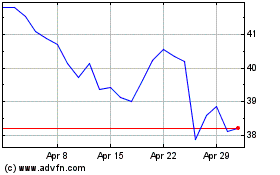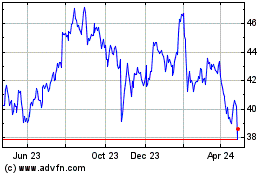An Antitrust Case That Feels Stuck in the Past -- WSJ
March 22 2018 - 3:02AM
Dow Jones News
By Greg Ip
This article is being republished as part of our daily
reproduction of WSJ.com articles that also appeared in the U.S.
print edition of The Wall Street Journal (March 22, 2018).
In the 17 months since AT&T Inc. and Time Warner Inc.
announced their merger, here is what their internet rivals have
been up to: Amazon.com Inc. won three Oscars, Hulu won the coveted
Emmy for best drama, Netflix Inc.'s market value surpassed Time
Warner's, and Facebook Inc. was ensnared in an electoral
manipulation probe.
You wouldn't know this from lawsuit the Trump administration has
filed to stop the AT&T-Time Warner merger. The suit, which went
to trial this week, seems conceived in a world before the internet
became a gigantic petri dish for video content.
This isn't a trivial omission. At the heart of every antitrust
case is the potential for a company to hurt its competitors and
consumers through its dominance of a market. If old media such as
Time Warner ever possessed such power, it is ebbing fast as the
clout of new media grows.
The Justice Department will win if it can persuade the court
that the merger's effect is "significantly to lessen competition,"
an inherently uncertain and subjective judgment. Yet the economic
test is more straightforward: For AT&T to exercise monopoly
power in the sale of content such as HBO and CNN, alternative
suppliers of content must face steep barriers. Those barriers are
falling.
Since 2005, University of Minnesota economist Joel Waldfogel has
shown, plunging prices for high-end digital cameras slashed the
cost of producing high-quality filmed entertainment, leading to an
explosion in the volume of new movies with no loss of quality.
Meanwhile broadband internet has provided a distribution
alternative to movie studios, television networks and cable. Since
2009, the number of original scripted series produced by online
houses such as Amazon, Netflix and Hulu has soared from one to 117,
now accounting for a quarter of all U.S. studio-produced
series.
Online video is also quite "sticky": Subscribers spend an
average of 124 minutes a day on Netflix, compared with 96 minutes
on Comcast properties (including NBC) and 46 minutes on Time Warner
channels, according to Steven Cahall and Mark Mahaney, analysts at
RBC Capital Markets.
They attribute this in part to their relatively high quality:
For every dollar of customer revenue, Netflix spends twice as much
on content as its next closest competitor. The analysts conclude
Netflix has plenty of room to raise prices. The stock market seems
to agree: In 2009 Netflix, then mostly still a distributor of disks
by mail, was worth 8% as much as Time Warner in 2009; it's now
worth 84% more.
The Justice Department argues that a combined AT&T-Time
Warner will have both the incentive and the ability to charge rival
distributors, both traditional and internet-based, more by
threatening to withhold content. AT&T says this is ridiculous:
Cutting off other distributors would cost it dearly in lost
revenue, and its leverage is minimal, because "an expanding array
of content sources" means no content is "genuinely essential for
any given distributor."
The Justice Department largely dismisses that prospect. Such
mistrust of free-market dynamism is unusual in a Republican
administration, particularly one that prides itself on taking the
shackles off business. It is also strikingly at odds with the
Justice Department's fellow Trump appointees at the Federal
Communications Commission. Last year the FCC rolled back "net
neutrality" rules that had barred internet providers from charging
more for faster access to their networks.
The commission concluded that net neutrality discourages
internet providers from experimenting with different business
models or expanding broadband capacity. That is what the antitrust
suit may do, if AT&T's rationale for the merger is taken at
face value. By delivering its content over AT&T's wireless
network, Time Warner would, as Amazon and Netflix now do, gain
valuable insight into subscribers, which it can use to improve its
offerings. That isn't feasible with Time Warner's existing model,
AT&T says.
"AT&T's overriding economic objective is to encourage
consumers to use its networks, no matter whose programs they
watch," the company adds. If owning Time Warner accomplishes that,
its network becomes more valuable -- and encourages it to
expand.
More than just economics, of course, hangs over this trial.
President Donald Trump, no fan of CNN, opposes the merger for, he
says, concentrating too much media power in too few hands. The
Justice Department says that played no role in its decision to sue,
but the claim still resonates, on the right and on the left.
Yet blocking mergers to preserve political diversity gets dicey
fast: Whose voices should be preserved? What degree of
cross-ownership is permissible: should Verizon Communications Inc.
be allowed to own Yahoo, or Walt Disney Co. to control
FiveThirtyEight? What if cross-ownership preserves otherwise
financially fragile political voices?
If you're worried about monopoly power over political speech,
there may be more fruitful places to look. According to the Pew
Research Center, 43% of Americans get their news from social media
and news apps, more than do from network, local or cable
television. Online platforms like Google and Facebook are closer to
monopolies than any old media counterpart. And as the revelations
over the use of Facebook data in political campaigns shows, they
can be weaponized in ways television never was.
Write to Greg Ip at greg.ip@wsj.com
(END) Dow Jones Newswires
March 22, 2018 02:47 ET (06:47 GMT)
Copyright (c) 2018 Dow Jones & Company, Inc.
Comcast (NASDAQ:CMCSA)
Historical Stock Chart
From Mar 2024 to Apr 2024

Comcast (NASDAQ:CMCSA)
Historical Stock Chart
From Apr 2023 to Apr 2024
